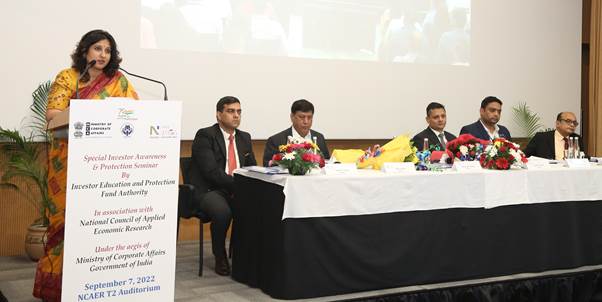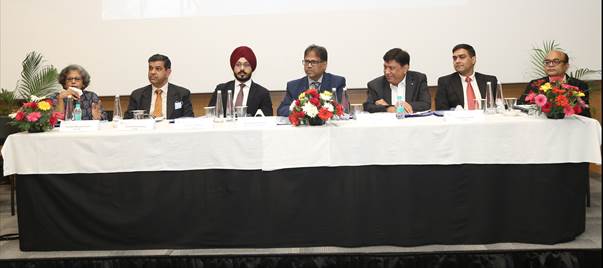
The Investor Education and Protection Fund Authority (IEPFA) and the National Council of Applied Economic Research (NCAER) organised a seminar on the occasion of the 6th Foundation Day of IEPFA here today, to promote financial literacy and investor awareness and protection among investors.
Smt Anita Shah Akella. CEO, IEPFA, delivered the keynote address on the IEPFA Foundation Day. Smt. Akella highlighted the imperative of educating investors and ensuring that all stakeholders are guaranteed their rightful shares, dividends and debentures.

During her Keynote address, Smt. Akella said, “The IEPFA has been playing a crucial role in educating investors and spreading financial literacy since its inception in 2016. We are also keen to spread financial literacy among the youth, especially school and college students, enabling them to adapt healthy financial behaviour and take informed financial and investing decisions in adulthood. IEPFA is thus a unique organisation, and we are very sensitive to the needs of the investors while protecting them from any kind of financial frauds. Our audience comprises a wide range of people from all strata of society, including the working population, students, rural inhabitants, self-help groups, and marginalised sections like vegetable vendors and fishermen, among others.”
In his address, Dr Mridul Saggar, the IEPF Chair Professor at NCAER and former Executive Director of RBI, highlighted future policies and practices envisaged for implementation by the IEPFA for the benefit of investors.
Dr Mridul Saggar talked on the various dimensions of investor protection, covering corporate governance issues, digital assets, and ESG investing. He drew attention to the sharp fall in the saving rate by 9.6 ppt at its peak and in the investment rate from 12.5 ppt at its peak in the economy, which has slowed down growth in the Indian economy. He said, “In order to lift back the saving and investment rate and make it grow faster, it is important to deepen and widen financial markets and focus on investor protection and financial stability.”
The panellists used attractive and live examples to educate the audience about possible frauds and diligence in making banking transactions, especially in the context of increasing digitisation. The seminar was characterised by active participation from the audience and interaction between the panellists and the audience.
The seminar was widely attended by the investor community, NCAER faculty, IEPFA staff, and students from the economics and business streams from various colleges, among others.
The IEPF Chair has been established at NCAER with the support of the IEPFA under the Ministry of Corporate Affairs, Government of India. Dr Saggar leads a group focused on research and policy outreach in the broad area of regulatory and public policies, including concerns about investor education and protection and financial sector reforms.

The seminar concluded with a Panel Discussion on “Investor Protection in a Digital World”, focusing on the need for safeguarding investors in an environment of increasing digitisation of financial transactions. The panel included eminent experts from the Reserve Bank of India (RBI), IEPFA and the Securities and Exchange Board of India (SEBI) and the cyber crime division of the Delhi Police, including Mr Jayant Kumar Dash, Executive Director, RBI, and Mr Girraj Prasad Garg, Executive Director, SEBI, and Shri K.P.S. Malhotra, Deputy Commissioner of Police, Intelligence Fusion and Strategic Operations (IFSO), Cyber Crime Unit of Delhi Police.
The panellists discussed the issue of cyber frauds at length. Dr Mridul Saggar suggested that India, in its G20 Presidency, should take up the issue of international coordination on various digital economy issues.
About IEPFA
The Investor Education and Protection Fund Authority (IEPFA) was set up on September 7, 2016, under the aegis of the Ministry of Corporate Affairs, Government of India, for administering the Investor Education and Protection Fund for making refunds of shares, unclaimed dividends, and matured deposits/debentures, among other things, to investors.
About NCAER
NCAER is India’s oldest and largest independent economic think tank, set up in 1956 to inform policy choices for both the public and private sectors. It is one of a few independent think tanks world-wide that combines rigorous economic analysis and policy outreach with deep data collection capabilities, particularly for large-scale household surveys. NCAER is led by its Director General, Dr Poonam Gupta, the institution’s first woman head, who assumed office on 1 July 2021, and it is governed by an independent Governing Body currently chaired by Mr Nandan M. Nilekani.
****
RM/PPG/KMN


